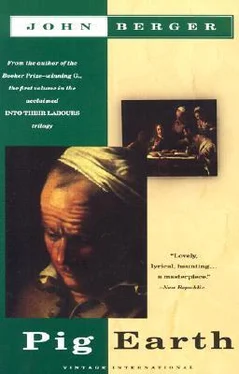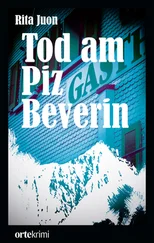“Rousa has gone,” he announced gravely.
“She must have wandered higher up.”
“I went to look, there’s no sign of her and I couldn’t hear her.”
“You don’t hear well,” she said. “I’ll go.”
“You can be deaf,” he replied, “or you can be very sharp of hearing, but if there’s nothing to hear, it doesn’t make any difference.”
“She has never gone off before.”
“She never turned mad before. Yesterday she tried to mount me. And did I tell you what I did? I saw her coming and I lay down. Today she smelt a bull in the wind.”
After the other cows were milked, the two of them set out to look for Rousa. The grasshoppers, with their back legs raised, kept hissing like snakes. It was possible to see for twenty, thirty kilometres. She strode faster than Joseph did, perhaps because she was more surprised by what had happened. The bells of the herds lower down sounded exactly the same as every evening. Yet Rousa was not to be found.
In winter it is impossible to remember exactly what cowbells sound like. One forgets, for instance, how at night they sound like stars clinking. In the same way it is impossible to recall, when once they have passed, how long the evenings are in June, when both light and mountains look equally permanent. In this horizontal endless light, towards ten o’clock, Joseph found Rousa lying in the grass, a hundred metres from the chalet. The sight of her, so reposeful and so near, startled him.
“Jésus!” he whispered. “How long have you been here?”
For an hour or so around midday the cows lay down to ruminate. When they got up that afternoon Rousa had strayed away from the others and climbed to the crest above the chalet. In her straying away there was already an unknown aim. From the crest she made her way down the other side, where rhododendra grow and where, in places, the slope is as steep as thirty degrees. A cow from the plains would have killed herself. But Rousa had spent six summers on the mountain. She even knew how to open the stable door if there was nobody there; she opened the door and the other cows followed her in. Rousa crossed the forest at the bottom of the next valley, picking her way carefully, because the creviced rocks and the roots of the spruces are like natural traps into which a heavy animal can fall and break a leg. Having crossed the forest, she climbed another crest so that she overlooked a third valley.
In this valley was a herd of eighty cows and two bulls. The bulls were white and belonged to the race of Charolais. Rousa mooed. She did not have to do this more than twice before one of the bulls recognised that the cow on the skyline was on heat. He climbed earnestly towards her. The second bull followed.
Did Rousa try to pull away from the great second white bull? Was she facing down the slope instead of up? Did her madness double so that she awaited a third bull or the return of the first? After receiving the first bull, was her appetite a little assuaged so that her back was able to bear less weight? The bulls weigh nearly a thousand kilos each. The questions will never be answered. The two bulls wandered down to join their herd and Rousa started her journey home.
When she was in sight of the door which she could open, fatigue overcame her and she lay down. Perhaps at this moment of her triumph, she was still unharmed. After resting, she knelt on her forelegs in order to get to her feet and reach the stable. But instead of being able to raise her hindquarters, those quarters whose insistent demand had forced her across a mountain, they toppled downwards, and her whole body followed. She was rolling down the slope. Each time her bent legs followed the arc of the sky and struck the ground again, she tried to dig them into the earth, and each time the momentum of her massive body was too much for her and she rolled another turn and with each turn she gained speed.
Joseph paced it out and found she had rolled a hundred metres. How she finally stopped herself was another mystery. He shrugged his shoulders. Yet she had stopped just in time. A few metres below, the slope increased to nearly forty-five degrees, and then nothing could have saved her. She would have hit the boulders at the bottom, a mass of unsellable broken meat and bone.
“Rousa’s come back!” he shouted.
Martine came running, and stopped short to see the cow unexpectedly on the ground.
“Has she broken a leg?”
Joseph shook his head.
Together they pushed and pulled to get the cow on to her feet. She would not budge.
“We can’t move her, the two of us by ourselves.”
“In the morning I’ll go down to get help,” he said.
“I’m not leaving her alone all night,” Martine insisted.
“A cow is an animal,” he said.
“I’m staying with her. She could roll down there on to the rocks.”
He walked away with his despondent walk.
“Twenty-seven years, and this is the first time I’ve had an accident with a cow.” She said this quietly as she felt the cow’s horns and ears. “A stupid accident. A stupid cow accident!”
With her complacent eyes Rousa followed the woman’s movements. Her horns were unhealthily cold.
Joseph came back with some blankets draped over his shoulders. Something had mollified him.
“I will stay with her,” he said.
“I won’t sleep anyway,” said Martine.
They spread the blankets over Rousa, and then over themselves.
“She knows what’s happening,” said Martine.
Cows rarely make any sound when in pain. At the most they blow heavily through their immense nostrils.
From under the blankets the two of them looked down at the far lights in the valley. The sky was clear, the Milky Way like a vast misty white goose pecking at the lip of a jug.
“If only she’d move,” whispered Martine, “I could milk her.”
She lay by the cow’s head, the halter rope coiled round her wrist. He lay between the cow’s four legs.
“The lights stay on all night in the villages,” he said. “One, two, three, four, five, six, seven, but none of them is my village.”
From out of his pocket he took a mouth-organ. He had had this mouth-organ for fifty years, since he was a conscript in the army. At that time, when he was young, he used to pretend to play an invisible trumpet, using only his lips and hands. If asked, he would entertain the whole barrack room by playing this trumpet which did not exist. One evening a friendly sergeant said: “You play well enough to have something to play on. Here, I’ve got two. Take this.” And so he acquired a mouth-organ.
As he played now, he tapped his foot on the mountainside and looked at the tiny clusters of lights below — no larger than grains of sugar, fallen from a spoon.
He played a polka, a quadrille, a waltz, “The Nightingale of the Sweet Wood,” a rigadoon. Neither she nor he could have said afterwards for how long he played. The night turned colder. As his foot beat time on the mountainside, his hands in the moonlight smoothed and ruffled each tune as if it were a bird miraculously perched on the instrument. All music is about survival, addressed to survivors. Once Rousa stirred, but she could not move her numb hindquarters.
When he stopped playing, Martine spoke very gently as if talking about a child being born. “I remember you used to play your mouth-organ when you first came to us.”
“Twelve years ago.”
“The Patron asked you”—she was laughing now—“if you could play The Charming Rosalie!”
“Twelve years and two months.”
“You remember the month!”
“Yes it was April. There was snow. I knocked on the door and asked if I could sleep in the barn. You said Yes. The next day it thawed, and the day after I helped plant the potatoes. If it hadn’t thawed that day, I wouldn’t be here now.”
Читать дальше












